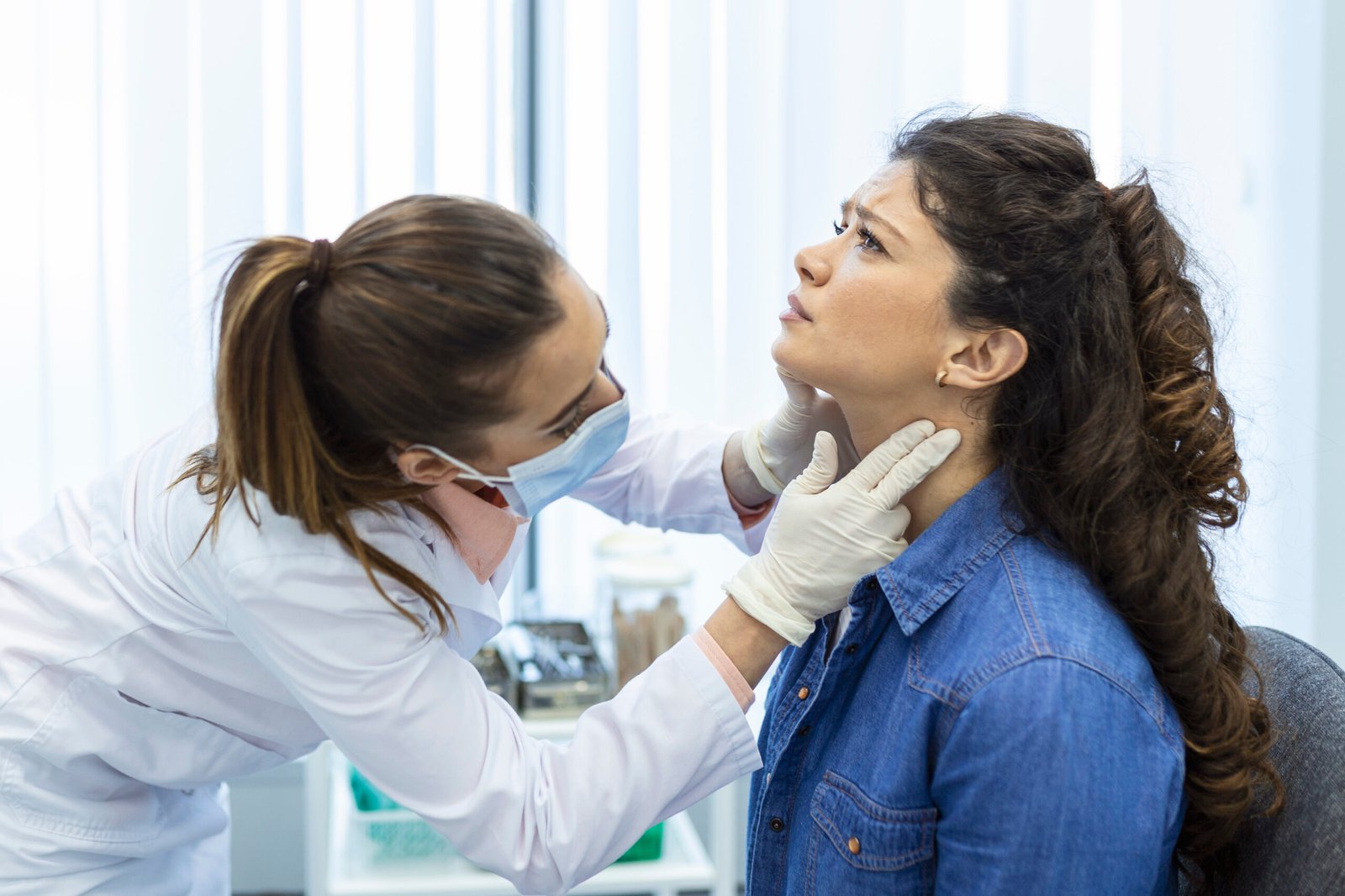Goiter, also known colloquially as “goiter,” is a very common thyroid disorder in which the thyroid gland becomes enlarged. In most cases, an iodine deficiency is responsible for the goiter. The body attempts to compensate for this by producing more thyroid cells.
Many sufferers don’t notice a goiter. It only becomes visible on the neck when it has grown very large. Symptoms such as a lump, tightness, or pressure in the throat can then occur.
In this article, you’ll learn what other symptoms indicate goiter, how it’s diagnosed and treated, and how to prevent it.
Brief overview: Goiter
- A goiter is an enlarged thyroid gland. The thyroid gland produces either too few or too many hormones. The most common cause of a goiter is a dietary iodine deficiency.
- Many people don’t notice a goiter because it grows slowly and only causes symptoms later. When the goiter grows large enough, those affected experience difficulty swallowing or a feeling of pressure and tightness in the throat. Sometimes, a goiter can also cause shortness of breath and hoarseness.
- A goiter is usually discovered incidentally during an examination. Doctors can diagnose a goiter by palpating the neck and performing an ultrasound. Thyroid levels and certain antibodies in the blood can provide clues to the cause of the enlarged thyroid.
- A goiter can be treated with medication, radiation, or surgery.
- You can prevent goiter by getting enough iodine from your diet.
What is goiter?
The term “goiter” comes from Latin and means glandular swelling or tumor. Goiter refers to an enlarged thyroid gland, also known in German as goiter. In a goiter, either the entire thyroid gland is larger than normal (diffuse goiter) or one or more nodules form within the thyroid gland (nodular goiter).
What is the thyroid? The thyroid is a small, thumb-sized organ located in the front of the neck. The thyroid produces the important thyroid hormones thyroxine T3 and triiodothyronine T4, thus influencing how quickly and smoothly our metabolism functions.
Causes: Why does goiter occur?
The most common cause of goiter is iodine deficiency. The thyroid gland needs iodine to produce thyroid hormones. If the thyroid gland doesn’t get enough iodine, it tries to use the available iodine as effectively as possible and produces more thyroid cells. The brain releases thyroid-stimulating hormone (TSH) to stimulate hormone production. This causes the thyroid cells to enlarge, resulting in the formation of new blood vessels and connective tissue. The thyroid gland continues to grow, and a goiter develops.
Less commonly, thyroid diseases such as Hashimoto’s thyroiditis or Graves’ disease cause goiter. In these cases, the body produces antibodies that attack its healthy thyroid tissue, leading to hormonal imbalances. In very rare cases, a tumor is responsible for goiter.
Other possible causes of goiter include:
- Hormonal changes during pregnancy, puberty, or menopause
- Thyroid inflammation (thyroiditis)
- Hypothyroidism
- Medications (such as antithyroid drugs)
- Thyroid autonomy (uncontrolled production of thyroid hormones) or ineffective thyroid hormones (hormone resistance)
- Cysts and injuries to the thyroid
What are the symptoms of goiter?
Most people with goiter don’t notice it because the thyroid tissue grows slowly over many decades. The enlargement is usually painless, invisible for a long time, or barely palpable. Often, the goiter is discovered incidentally during a medical examination.
However, once the goiter has reached a certain size, those affected often feel a lump, tightness, or pressure in the throat, sometimes even an annoying urge to clear their throat. If the thyroid gland presses on the esophagus, swallowing difficulties can occur. If the goiter presses on the trachea, those affected may also experience breathing difficulties or shortness of breath.
In some people with goiter, the thyroid produces too few hormones. Those affected then experience symptoms of hypothyroidism, such as fatigue, chills, constipation, lethargy, or weight gain. Less commonly, people with goiter show signs of hyperthyroidism, meaning the thyroid produces too many hormones. This can lead to unintentional weight loss, sweating, and restlessness.
Is a goiter dangerous? If your neck is thickened, you should definitely see a doctor. An untreated goiter can cause the thyroid to produce hormones uncontrollably. Doctors then refer to this as functional autonomy, which can be life-threatening. Furthermore, a goiter can develop into thyroid cancer over time. The risk of this is about four percent [6] .
How is goiter diagnosed?
Sometimes sufferers feel a goiter themselves; more often, it’s discovered incidentally during an examination. If goiter is suspected, an ultrasound is performed. This allows doctors to more accurately determine the size of the goiter and whether it has formed lumps.
Depending on how enlarged the thyroid gland is, goiter is divided into three grades and various intermediate stages according to the World Health Organization (WHO):
- Grade 0: only detectable by ultrasound
- Grade 1: Enlargement palpable
- Grade 1a: Palpable and not visible even when the head is tilted backwards
- Grade 1b: Palpable and only visible when the head is tilted backward
- Grade 2: Palpable and visible with normal head position
- Grade 3: Very large goiter with local symptoms (such as difficulty breathing)
Doctors then measure the most important thyroid hormone levels (TSH, T3, and T4) in the blood. The amount of these hormones in the blood provides clues as to whether the goiter is caused by, for example, an underactive thyroid or an overactive thyroid. Certain antibodies in the blood can also provide clues to the cause of the goiter (such as Graves’ disease).
If doctors suspect thyroid cancer, they take a small tissue sample (biopsy) from the goiter and have it examined more closely.
How is goiter treated?
In most cases, goiter is not dangerous, but it should always be treated. The goal is to shrink the thyroid and eliminate the cause of the goiter.
Depending on the size of the goiter and whether it continues to grow, doctors can treat it with medication (iodine, thyroid hormones) or radiation therapy with radioactive iodine (radioiodine therapy).
Sometimes part of the thyroid is removed during surgery. This may be necessary if the goiter is very large, if it contains nodules, or if it is pressing on the trachea, esophagus, blood vessels, or vocal cord nerves. The remaining thyroid tissue in the body can continue to produce hormones after surgery. However, if the thyroid is enlarged due to a malignant tumor, doctors usually remove the entire thyroid.
Is goiter curable? In most cases, goiter regresses if affected individuals regularly take iodine and thyroid tablets (levothyroxine). To prevent a goiter from recurring, affected individuals should continue to take 100 to 150 micrograms of iodine daily even after treatment and undergo regular examinations.
How can I prevent goiter?
You can prevent goiter by getting enough iodine from your diet every day: adolescents and adults need about 200 micrograms of iodine per day. Good sources include sea fish, seafood, milk, dairy products, eggs, and iodized table salt.
Iodine is an essential trace element that humans must regularly consume through food. Iodine is scarce in European soils, so many plants and animal products naturally contain very little iodine. However, since table salt has been fortified with iodine and food manufacturers also use such iodized salt, the iodine supply in the population has improved. Read more about iodine in food on our health portal.
Good to know: Seaweed can be particularly rich in iodine. However, some algae contain extremely high amounts of iodine, which poses health risks: They can disrupt thyroid function. Therefore, experts advise against excessive consumption of algae or algae supplements. Those who follow a vegan diet are better advised to consult a doctor and take tablets or supplements containing a defined amount of iodine. Pregnant and breastfeeding women should also supplement their diet with iodine tablets under medical supervision, as they have an increased need.























+ There are no comments
Add yours